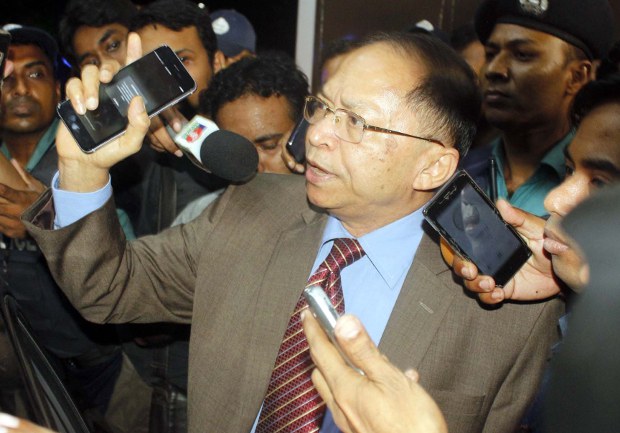Chief Justice Leaves Bangladesh, Denies Illness Claim
2017.10.13
Dhaka
 Bangladesh’s Chief Justice Surendra Kumar Sinha answers questions from reporters outside his home in Dhaka before heading to the airport to take his flight for Australia, Oct. 13, 2017.
Bangladesh’s Chief Justice Surendra Kumar Sinha answers questions from reporters outside his home in Dhaka before heading to the airport to take his flight for Australia, Oct. 13, 2017.
Bangladesh Chief Justice S.K. Sinha left the country for Australia late Friday night, denying government claims that he had taken sick and saying a Supreme Court ruling had made the ruling party angry at him.
Reporters swarmed the departing judge outside his residence in Dhaka to hear his first public statements since the government’s shock announcement that he was ill with cancer and taking a one-month sick leave. He had been seen in public only once since then.
“I am not sick. I am quite OK. I am not escaping. I will come back again,” Sinha told reporters outside his home in Dhaka as he was leaving for the airport to board a Singapore Airlines flight.
Sinha left Bangladesh following a spate of criticism from leaders of the ruling Awami League over the Supreme Court’s unanimous July 3 ruling that voided a constitutional amendment.
“I am the guardian of the judiciary. I am going out temporarily for the interest of the judiciary, so that it doesn’t get polluted anyhow,” he said.
The Supreme Court Bar Association has claimed that the government pressured Sinha to go on sick leave because of the controversy around the court’s decision to repeal the 16th amendment. Law Minister Anisul Haque told reporters on Oct. 3 that the chief justice was taking a break from his duties and going abroad for medical reasons.
“The chief justice has been suffering from cancer and different other ailments, which are yet to be cured completely,” Haque said. “That’s why he’s decided to take the month off.”
Local newspapers had also reported that the chief justice was going to Australia to see his daughter.
The minister’s announcement that Sinha was taking sick leave came on the eve of the year’s final Supreme Court session. The announcement surprised many people because the judge was due to retire after the session.
Before boarding his flight, Sinha issued a statement expressing his “embarrassment” over recent criticisms from politicians and government officials, including Prime Minister Sheikh Hasina.
“I firmly believe that the prime minister got angry with me because a group inside the government has misinterpreted my verdict,” Sinha said.
In its 799-page ruling on July 3, the Supreme Court said that giving the legislature or executive branch the power to remove justices from the court’s bench would hamper the basic structure of the constitution that requires equal separation of powers among the three branches of government.
The threat of impeachment proceedings would subject judges to exploitation by politicians, Sinha said in his ruling.
After the High Court’s ruling, Haque said Sinha’s comments belittled Sheikh Majibur Rahman, the nation’s founder and first president, particularly when the chief justice said that “no nation, no country is made of or by one person … we must keep ourselves free from this suicidal ambition.”
Haque, in his statement that was widely supported by Awami League officials, said Bangladesh emerged as an independent nation under Rahman’s leadership. Rahman, who was assassinated in 1975, is Prime Minister Hasina’s father.
Party leaders also demanded Sinha’s resignation.
The Bangladeshi constitution, which was established on Dec. 16, 1972, provided a parliamentary form of government and conferred power on the parliament to amend the constitution through a two-third majority. Since then, according to political observers, amendments have been used to serve the interests of the country’s ruler or the ruling party.
Sinha said he was “also a bit worried about freedom of the judiciary,” citing comments from Haque that acting chief justice Abdul Wahhab Miah would soon revamp the Supreme Court.
“If there is any interference in the chief justice’s administration, it can easily be understood that the government is basically interfering with the highest court, which will worsen the relationship between the government and the judiciary,” he said. “This will bring no good for the country.”







